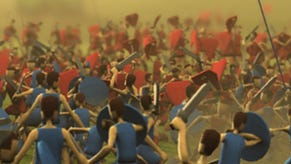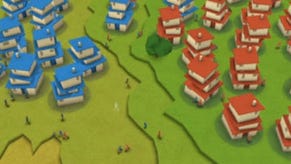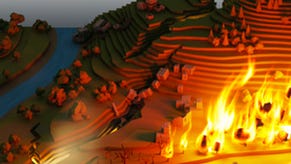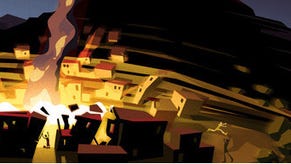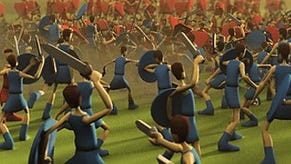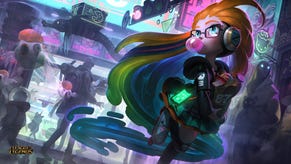Project Godus: Molyneux returns to his roots
Project Godus is the debut game from 22 Cans. VG247's Dave Cook speaks with Peter Molyneux about gameplay, the pros of Kickstarter, and the dangers of over-promising.
“I’ve always had this problem with power and controllers, because controllers feel great when you pull that trigger and it fires that gun, but trying to do a god game on a controller is always going to be a problem.”
The past month has been a difficult for industry veteran Peter Molyneux. His new studio 22 Cans launched its first 'experiment' Curiosity: What's inside the Cube? to a wave of technical hiccups and immense backlash from disgruntled fans.
Apologetic blog posts and interviews with the developer suggested that the experiment had gone awry, and that the pressure was starting to take its toll. Then, a tearful interview with Rock, Paper Shotgun sealed the deal - I simply had to speak with him myself to find out where all of this effort is heading.
Molyneux has made no secret that Curiosity, its follow-up Cooperation, and the rest of the studio's 22 experiments would contribute towards the development of its first full game. The game was recently revealed as Project Godus, a reinvention of Molyneux's first game release Populous.
When I spoke with Molyneux on the phone just a day after his emotional Rock, Paper, Shotgun interview, he sounded deflated and far removed from the enthusiastic free-thinker we either choose to love or hate so much.
As we talked he frequently back-tracked, reiterated and corrected himself for fear of digging a deeper pit, or to avoid accidentally over-promising something, as he himself admitted that he often does. We were there to talk about Project Godus, which sounds ambitious, but definitely not beyond the realm of possibility.
It's a game that sees you stepping into the role of a powerful god, and using touch - be it on Android or iOS - to sculpt the landscape with your hands. Tiny followers will then start exploiting the land you've made to populate the area, worshipping you in greater numbers as they advance.
You've got the touch
Molyneux explained that the rise in touch devices is key to the Godus experience, and it's something that gives developers more tangible and intuitive control methods to explore than back when he created Populous in 1989.
"I've always had this problem with power and controllers, because controllers feel great when you pull that trigger and it fires that gun, but trying to do a god game on a controller is always going to be a problem.
“Feeling like you can do that – literally ripping the landscape open with your fingers, or grabbing it with the mouse, or throwing tornadoes – I mean, that’s going to feel incredible.
"But now we've got touch, and now I can say, 'You can rip a landscape open', and you immediately know what I mean. I don't have to tell you that you press button A, or button B. You'd literally rip the landscape open with your fingers on touch, or with a mouse. That just immediately sounds exciting.
"Those things weren't even possible back then so there's a lot we can use. If you then combine that with all the stuff on the cloud and how you can connect people together, and how you can have amazing multiplayer... I mean that is just insanely exciting.
"You can go back to those earliest days and think, 'Hang on a second. It isn't just Populous or Elite'. There is a whole range of games we really should be looking at again, and wondering if they can be re-authored, or re-invented."
The developer then recalls the precise moment when he knew he wanted to return to the god genre, "I'll be quite honest with you, I got so excited about redoing a god game when I played a game on my iPhone called Swords and Sworcery.
"Now, there's a moment in the game where you pull two mountains apart, and I just thought, 'Oh my god! That just feels awesome. That's incredible,' and if anything, that was the inspiration that got me thinking, 'I've got to go back and do something with a god game.'
"Because feeling like you can do that – literally ripping the landscape open with your fingers, or grabbing it with the mouse, or throwing tornadoes – I mean, that's going to feel incredible. It'll feel ten times more incredible because we're going to be supporting co-op.
"So it could be me and you versus two of our friends, working together to make landscapes, spreading our people out while competing with other gods. It's just going to be fantastic multiplayer stuff."
Sculpting land using touch or your computer's mouse is one of the core functions of Godus, and once you start to have enough followers living on your plot worshipping you, players will earn belief, which can be used to unlock new powers.
“Godus is as much a single player game as it’s a multiplayer game. Because people are getting confused that it’s just multiplayer. There is a single player world, and as part of that single player world you have a land that persists whether you’re on these things called ‘Crusades’ or not. That land will be connected to lots of other lands. You’ll see exactly what I mean by that soon.”
"The simple mechanic is that you sculpt the land," Molyneux explained, "and think about the word 'sculpt' because it's a really important word. There's a lot of meaning in 'sculpt', as you're making these mountains and valleys, and sculpting these rivers. It's amazing what you can do, and I better not even talk about the water stuff because it's just so cool.
"You sculpt the land and your little people exploit what you do as a god. So if your sculpting means they can build a house on land, then they will. If it means they can take things from the landscape, they will.
"The more they exploit that landscape the more they breed, the more people you have the more you belief you get, the more belief you have the more god powers you earn.
"There are two flavours of god powers: you have destructive, incredible and tactile god powers like volcanoes, earthquakes and tornadoes versus what we call 'Gift of the Gods' – these things that you can give to your people."
But although Molyneux is keen to stress that Godus will attempt multiplayer on a wide scale - in which several gods can interact online, using the lessons learned from the Curiosity experiment - he has to be clear that there is also a deep single-player experience being proposed.
"Godus is as much a single player game as it’s a multiplayer game," he stressed, "Because people are getting confused that it’s just multiplayer. There is a single player world, and as part of that single player world you have a land that persists whether you’re on these things called ‘Crusades’ or not. That land will be connected to lots of other lands. You’ll see exactly what I mean by that soon."
Although Molyneux told me that Curiosity will help craft the cloud and mutlitplayer based features within Godus, I had to ask him how the two specifically relate, because as both he and I were abundantly aware, Curiosity has not been without issue.
”In version two of Curiosity we’re introducing a new way to destroy cubelets, as we want to make that a bit deeper than it is now. It’s quite cool, and then you’ll be able to see more of the link to Godus.”
"There’s a couple of tech things, and one of those tech things is slightly sensitive to talk about, given what happened with Curiosity. One of those tech things is if we take multiplayer – how does that actually work? – and you can see that stuff in Curiosity.
"We’re working on version two now, I’ve been looking at it today. Now you really can see other people’s patterns as they happen. There’s not a delay. If someone taps, you see it immediately. “Using that technology in something like Godus… it would be so cool to have lots of people connected together in the same world, but we’re going to go into details of that soon.
"The other thing is, there is this question about how enjoyable is it to do simple things. Now, the simple things in Curiosity are the taps, and you cannot get simpler than that. It’s the baseline of simple, but how enjoyable can you make that action?
"There’s some interesting things, as I assumed with Curiosity that people would only tap 100-200 times in maybe a day, then maybe come back to do a tiny bit of tapping. But I’ve been blown away at how beheld lots of people feel in just tapping, going on and to keep on tapping.
"That is fascinating. In version two of Curiosity we’re introducing a new way to destroy cubelets, as we want to make that a bit deeper than it is now. It’s quite cool, and then you’ll be able to see more of the link to Godus."
Over-Promising
It's at this point our discussion took a turn for the serious, and it was almost as if Molyneux himself realised he was getting excited again. It was a shame, because if developers aren't allowed to speak freely without fear of a backlash, then they're no better than PR-trained employees reading from a carefully-prepared script.
I posed this analogy to him, and he cautiously agreed, "It's this fine line that you walk down, and I can understand about over-promising. If a film director comes on TV and says 'This is going to be the greatest film ever', that's what I expect, to believe his promise. I completely understand that, but equally, I really believe what I'm saying, and I say these things to the team.
"I'd rather – even if I do get shot down nine times out of ten – reach for that promise. The great thing about people coming back to say I'm over-promising just motivates me to do better, because I think one day I'll under-promise, and that's going to really surprise people."
“I’ve said these ridiculous things in the press about, ‘This is the greatest role-playing game ever’, and, ‘This is going to be the greatest this or that’,” Molyneux admitted, “That has always been honestly in my heart what I’ve tried to do, and I’ve got my list of excuses I could give you.”
The freedom to be able to remain independent, create a dialogue with gamers and to remain transparent is what drew Molyneux to Kickstarter in the place. But key to this entire campaign is the Project Godus beta.
I saw Molyneux present a developer session at this year's Eurogamer Expo, in which he stated he had made several 'good' games but has yet to make a 'great' one. I ask him if Godus is the elusive 'great' game he's been chasing all these years, and if so, how Kickstarter will help make it a reality.
"I've said these ridiculous things in the press about, 'This is the greatest role-playing game ever', and, 'This is going to be the greatest this or that'," Molyneux admitted, "That has always been honestly in my heart what I've tried to do, and I've got my list of excuses I could give you, and you'd probably say, 'Oh that's fair enough'.
"But ultimately what is the secret to making a great game? Certainly the best games that I feel I've played are the ones I've played the most, and that is the trick. It's a trick I'm going to use with Kickstarter, because if you look at the pledges on Kickstarter, we start on a really low tier with beta access.
"That's because what I want is to play Godus with hundreds and hundreds of people, over and over again until we get it right. Because it's not just the old days where you can go in your ivory tower, lock yourself away and hope that you get games right, nor is it a publicity stunt which a lot of betas are, or a way of drumming up press interest.
"This is the real power of Kickstarter: how do you find the best beta testers who care most about the game? It's obvious, they're the ones who have actually put money down and said, 'Look, I care about this game and I want to see it come about.'"
Molyneux both admires and cites Notch's staggered alpha release of Minecraft as a perfect example of why the Kickstarter and beta model will help turn Godus from a sound concept into a 'great' gaming experience. But he stressed that such a free approach would never happen under a large publisher.
"If I ever said to a publisher – as I have in the past – 'We should release an early version of this and see what people think', they'd say, 'No, no, no, you've got to have shock and awe, you have to keep your features secret, we can't talk about it. You demo it and only show a little sliver of it'.
"F**k all that. Let's just work as hard as we possibly can to make great features as early as we possibly can, work hard on a prototype that we can start showing off very soon.
”“I think everyone thinks I got all the money from Fable somehow. In fact someone done the calculations on Twitter saying, ‘Oh, Fable’s sold 12 million copies so Peter Molyneux must have £100 billion in the bank.”
"Let's just refine it, play it, and play it. You know, with the original Populous Glen and I played for hundreds and hundreds of hours, and it wasn't a genius of design, but we just loved playing the game.
"If we can do that, then maybe what I said at Eurogamer Expo is the secret? Maybe it isn't to pretend that I know everything, that me as a designer doesn't have every feature mapped out in my head. I can start that off, but maybe through that beta test program we can refine it, tweak it, balance it and get it so it really sings."
Although Molyneux does make lofty promises, I ask him if he ever feels like the public mistake the wealth and scale of the 22 Cans operation. Many gamers have stated their assumptions over the developer's wealth and have argued that Molyneux simply throw money at Curiosity to make its server problems go away.
The reality of the matter is quite different, Molyneux stated, "I think everyone thinks I got all the money from Fable somehow. In fact someone done the calculations on Twitter saying, 'Oh, Fable's sold 12 million copies so Peter Molyneux must have £100 billion in the bank.'
"But actually the way it worked at Lionhead, and the same way it works at 22 Cans, is that at Lionhead I didn't even have 50%, instead I had some shares in the company, the same as 22 Cans. Everybody's got shares, and I'm not complaining about the amount of money I made out of Lionhead at all, but it wasn't fortunes, and I don't drive around in a gold-plated cars
I follow up by asking if this independence, while not generating the kind of millions you'd usually associate with big name developers, gives the studio the kind of freedom Molyneux hasn't had for a while.
“When the original Populous was made we weren’t funded at all. We had no publisher until right at the very end, and I think if we had a publisher like you have today, there would never have been a Populous.”
"It does," he agreed, "and that's what's brilliant about it, as it does involve people. I've got nothing against publishers, I think they do a fantastic job, and I think they are a great source of revenue for a number of developers.
"But they do prohibit you from doing some things that we were able to do in the early days of the industry, such as really communicating with your customers, and to have a connection with your customers.
"When the original Populous was made we weren't funded at all. We had no publisher until right at the very end, and I think if we had a publisher like you have today, there would never have been a Populous."
Now Populous fans, wouldn't that have been a waste? So while Molyneux's new-found independence has hit a number of bumps along the way, it's comforting to see it breeding a wealth of fresh ideas.
I understand why many gamers feel burned by Molyneux's promises, and he sincerely does too, but if all developers read from a script and created games by committee, would we be more likely to listen to and believe in his promises, or would he be labelled a quack?
That's the question isn't it? At what point does out belief become stretched too thin? Share your own thoughts below.








